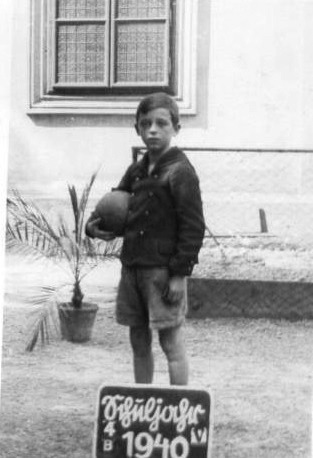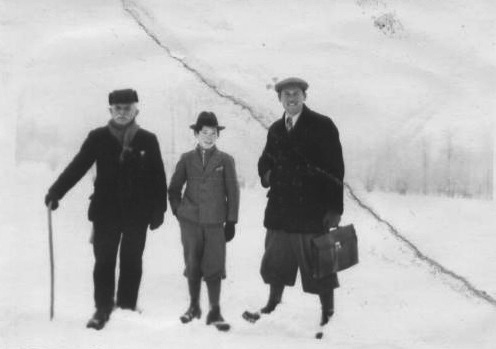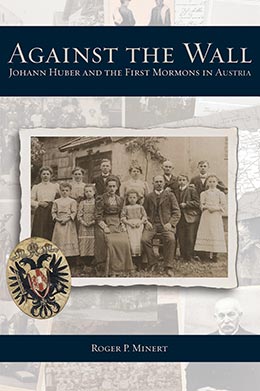Appendix B
Roger P. Minert, Against the Wall: Johann Huber and the First Mormons in Austria (Provo, UT: Religious Studies Center; Salt Lake City: Deseret Book, 2015), 205–10.
Wilhelm Hirschmann, a grandson of Johann Huber, was born in Vienna, Austria, in 1930 and now resides in Aggsbach Markt, Austria. He was interviewed in German by Roger P. Minert by telephone on October 3, 2014 (translation by Roger P. Minert).
Topic: Johann Huber (1861–1941), Michlmayr farmer in Parz and first LDS branch president in Austria
Minert: How often did you go to Rottenbach, and how long did you stay there?
Hirschmann: Every summer from about 1936 to 1944: I left Vienna the same day I got my report card in the spring and headed for the train station. I might have been picked up in Haag by somebody, but I usually just walked to the farm. I knew the way and didn’t have much to carry. I returned to Vienna the day before school started again. I never did anything for school while I was in Rottenbach; I was just a farm boy.
Minert: How did you get to Rottenbach from Vienna?
Hirschmann: I took the train to Haag am Hausruck. When they picked me up, it was with the horse and wagon, which felt like a much more formal mode of transportation than it does nowadays.
Minert: How tall was Johann Huber? How much did he weigh?
Hirschmann: He was about 5´6˝ and probably weighed no more than 150 or 160 pounds.
Minert: What was your grandfather’s voice like?
Hirschmann: He had a very mild voice. He was not a man of many words, but his voice was majestic. I never heard him curse, but his son Johann cursed a lot. Sometimes [Grandpa] and I would walk through the fields and he would tell me how things grew. I remember him saying that the moon had an effect on the weather: a full moon meant good weather, for example. Of course, that was not scientific—just folk wisdom.
Minert: What kind of father was Johann Huber?
 Willi Hirschmann in his fourth grade school picture; this is how he appeared when his grandfather died. Courtesy of Gerlinde Huber Wambacher.
Willi Hirschmann in his fourth grade school picture; this is how he appeared when his grandfather died. Courtesy of Gerlinde Huber Wambacher.
Hirschmann: He was a typical Austrian father for his time. He was neither hard on his family, nor overly sentimental. He didn’t praise us or yell at us. And he never gave me any presents, spending money, etc. It was a present enough to just live there and be part of the family.
His relationship with Johann [Jr.] was not a good one. He apparently didn’t trust his son and didn’t want him to inherit the farm. In fact, my brother Kurt, who had been sent by my mother to live there when he was three (my father was unemployed at the time) was going to inherit the farm. My grandfather considered [Kurt] to be better qualified to run the farm than Johann Jr. That situation made for a very poor relationship between Kurt and our uncle Johann, and Kurt was often mistreated by our uncle. As it turned out, Kurt returned to Vienna in about 1938 and became a mechanic; he didn’t even want the farm, even though our father wanted him to inherit it. Johann did inherit the farm after his father’s death, but he didn’t marry until later [1942].
Johann Huber treated his daughters really well: he gave each of them a nice dowry when they married. Otherwise, nobody but the heir to the farm was supposed to get anything of substance; that was the practice on all of the other farms.
Minert: How did he get along with his second wife, Anna Bertha née Koehler?
Hirschmann: He found her by writing letters to the Berlin branch. He might have met her somewhere before they married. I saw him try to kiss her on several occasions, but she would jokingly say, “Don’t! Your mustache will scratch me!”
Minert: How did he treat his grandchildren?
Hirschmann: Just as would be expected of an Austrian grandfather. I don’t ever recall him telling me bedtime stories or sitting me on his lap. I never expected that to happen. He never gave me gifts or anything; children didn’t get presents in those days. That would have been an odd occasion. I didn’t have to get up as early as he did, but I worked on the farm just like everybody else. Sometimes I got to drive the wagon back to the barn, and that was a real treat; I felt like a big man.
Minert: Did he employ non-family members on the farm? How did he treat them?
Hirschmann: He was always the one in charge of the farm. There were young men and women living and working on the farm. They were treated the same way as the young men and women on the other farms in town. Everybody got chewed out on a regular basis, and nobody received praise. That sort of poisoned the atmosphere, but that’s the way things were in Upper Austria in those days. My grandfather was a hard worker. Depending on the work to be done on a given day, he got up between 3 and 5 a.m. and fell into bed exhausted every night.
Minert: What can you recall about his relationships with neighbors?
Hirschmann: He was well known; everybody within fifteen miles knew that Johann Huber was a Mormon. He had an excellent reputation.
Minert: Was Johann Huber a member of the town band?
Hirschmann: Yes, he played the trumpet. In those days nobody could play the song solo; you only knew your part. I recall hearing him practice his trumpet part quite often.
Minert: Did your grandfather still go to church every week when you knew him?
Hirschmann: He went to church every Sunday morning with me all the time I knew him. We walked, and Johann Jr. had a bicycle. He carried a cane and the trip to Haag took about 45 minutes. And he probably went back in the evening for sacrament meeting, but I didn’t go along for that. When we were walking home from our morning church meetings, he would always stop and talk with anybody we met; they talked about the weather and lots of other things, but he somehow always found a way to talk about the gospel. I just wanted to hurry on home because our Sunday meal was always a roast, and I couldn’t wait to eat.
Minert: Were there any motorized vehicles or equipment on the farm?
Hirschmann: There were none until several years after World War II. They didn’t own an automobile either.
 Huber with grandson Kurt Hirschmann and Josef Grob on their way to church on a wintry day in 1940. Courtesy of Gerlinde Huber Wambacher
Huber with grandson Kurt Hirschmann and Josef Grob on their way to church on a wintry day in 1940. Courtesy of Gerlinde Huber Wambacher
Minert: Did your grandfather visit you in Vienna? Did he travel to Munich in those days?
Hirschmann: He may have come to Vienna for a [church] conference, but I don’t recall ever seeing him there. He may have traveled to Munich because that was closer to Rottenbach.
Minert: Did Johann Huber often talk about the gospel? Did he pray and read scriptures, etc.?
Hirschmann: We had a prayer at our main [midday] meal, and we took turns praying. I don’t recall reading from the Bible together, but he read alone. And we had regular Sunday visits from the home teachers.
Minert: Describe your grandmother Anna Bertha née Koehler. Did she speak the Berlin dialect?
Hirschmann: She got along fine with the local language. She knew High German, and so did the Rottenbach neighbors because they had all learned it in school. The language wouldn’t have been a challenge. Besides, she didn’t have that much contact with neighbors because she was so busy with her domestic chores.
The older Huber children didn’t like her that much because they felt that they didn’t need a mother after their natural mother [Therese née Mayer] had passed away, which is perfectly natural. That was a real struggle for her. And she let her husband know that only on a rare occasion would she agree to work in the fields; her working place was in the home, and he accepted that. As a result of her hard work in the home, she had something that was not common in the neighborhood, namely a very orderly household.
Minert: Was Johann Huber a member of the Nazi Party?
Hirschmann: I didn’t know about that at the time, but the death notice in the regional Nazi Party newsletter says he was. But he wasn’t an active member, and he probably only joined because it was advantageous for church members to go along in those days. But Johann Jr. was an active member—one of those who joined the party even before the Anschluss [in 1938].
